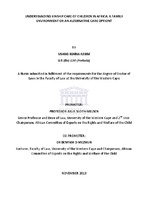| dc.contributor.advisor | Sloth-Nielsen, Julia | |
| dc.contributor.advisor | Mezmur, Benyam D. | |
| dc.contributor.author | Assim, Usang Maria | |
| dc.date.accessioned | 2014-07-18T09:16:52Z | |
| dc.date.available | 2014-07-18T09:16:52Z | |
| dc.date.issued | 2013 | |
| dc.identifier.uri | http://hdl.handle.net/11394/3476 | |
| dc.description | Doctor Legum - LLD | en_US |
| dc.description.abstract | In Africa generally, orphaned and vulnerable children are traditionally cared for by their relatives or close family friends; this is an abiding practice even in contemporary times. This was historically considered to be a moral obligation binding on different relatives in different ways or at differing levels. In the face of the increasing complexities and changing demographics in African societies, high levels of poverty and socioeconomic
inequalities as well as the incidence of HIV and AIDS, among others, the traditional family continues to undergo structural changes and experience various challenges which make child rearing responsibilities difficult to cope with especially in the context of loss of parental care. Nonetheless, the extended family system still bears the greatest burden in caring for such children, despite the obligation of governments to provide alternative care for children without parental care. The care of children who have
become deprived of parental care by other relatives/family members or family friends is generally described as kinship care. This study seeks to examine kinship care against the background of international children’s rights law as encapsulated in the United Nations Convention on the Rights of the Child, the United Nations Guidelines on
the Alternative Care of Children and the African Charter on the Rights and Welfare of the Child, among others. Thus, this research seeks answers to a number of related research questions such as: Does the international children’s rights framework recognise or provide for kinship care as a measure of alternative care for children deprived of a family environment? What is the history and practice of kinship care in
Africa and what are the challenges confronting kinship care in contemporary African societies? What is the relationship between kinship care and the child protection system? And what forms of support are available for kinship care at both the international and national levels? Four main themes are considered in separate chapters of the thesis as follows: the contextual and historical background to kinship care in Africa; the international and regional legal framework on the right to alternative care; the conceptualisation of kinship care as alternative care; and the law and practice of
kinship care in selected domestic jurisdictions. South Africa and Namibia are the main focus of this study in the chapter on the status of kinship care at the domestic level. This is mainly because both countries have made some progress in the attempts at (legally) providing for kinship care and addressing some of its attendant challenges, with a particular emphasis on the provision of support for kinship care. | en_US |
| dc.language.iso | en | en_US |
| dc.publisher | University of Western Cape | en_US |
| dc.subject | Kinship care | en_US |
| dc.subject | Kin/Extended family | en_US |
| dc.subject | Alternative care | en_US |
| dc.subject | Foster care | en_US |
| dc.subject | Child protection | en_US |
| dc.subject | Children's rights | en_US |
| dc.subject | Family/Family environment | en_US |
| dc.subject | Convention on the Rights of the Child | en_US |
| dc.subject | African Children's Charter | en_US |
| dc.subject | UN guidelines on the alternative care of children | en_US |
| dc.title | Understanding kinship care of children in Africa: a family environment or an alternative care option? | en_US |
| dc.type | Thesis | en_US |
| dc.rights.holder | University of Western Cape | en_US |

